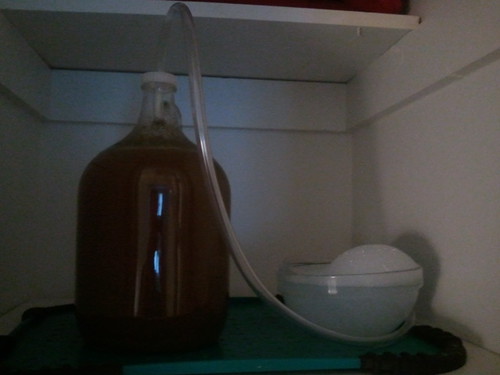Bourbon Dubbel from Brooklyn Brew Shop on Vimeo.
I have had a port-barrel aged ale before, loved it and wanted to recreate something like what I had. Using the kit I soaked the oak chips overnight in a great late bottled vintage port for 24 hours.
The brewing itself was pretty straight forward, not as complicated as this makes it look:
Water needed to be brought to 160 degrees and the grains mashed in. Keep the grains soaking for an hour between 145-160 degrees then mash out as you raise the heat to 170 degrees. Run additional water at the same temperature through your grains for a sparge, then take that mixture and run it through your grains again.
Take that water, now wort, and bring up to a boil until you reach heat break. Depending on your brew, low boil the wort for an hour and add your hops and any additional flavor ingredients at their allotted times.
 After an hour cool your wort to 70 degrees as quickly as possible. Strain the cooled wort into your carboy and add your yeast. Cap the carboy with a blow-off tube and let it sit in a cool dark place for two weeks. After the two weeks have passed bottle your beer and let it sit for another two weeks. Finally, sit back, relax and open your fresh, home-made beer.
After an hour cool your wort to 70 degrees as quickly as possible. Strain the cooled wort into your carboy and add your yeast. Cap the carboy with a blow-off tube and let it sit in a cool dark place for two weeks. After the two weeks have passed bottle your beer and let it sit for another two weeks. Finally, sit back, relax and open your fresh, home-made beer.I'm actually going to talk more about each portion of the brewing process more as I continue the blog with a focused post on each step. I did learn some valuable lessons on my first foray into brewing though.
1. It's not as hard as it looks.
2. Remember is sanitize everything.
3. I needed two identicle 6 quart stock pot. I had to improvise quickly when the first pot didn't hold enough to sparge the grains.
4. The longer you let the beer bottle age the smoother it will be. I let one bottle sit for an additional four weeks and it was much better then the ones I let sit for the minimum time.
No comments:
Post a Comment